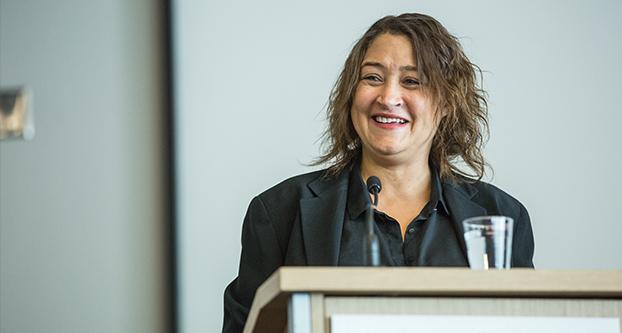Associated Students, Inc. (ASI), the Academic Senate and the Office of the Provost co-sponsored a forum in the North Gym on Monday in hopes of informing students about the First Amendment and its responsibilities.
The First Amendment Free Speech Forum began with an address from Fresno State President Dr. Joseph Castro.
“We’ve got a full house here,” Castro said as he greeted the audience. “This forum — the timing of it is perfect.”
Castro said the conversation on free speech is crucial given the condition of our “national political climate.”
“We are seeing unprecedented levels of incivility, of disrespect. And in case you might think that’s OK, I hope that you’ll come out of today’s conversation understanding that that is not OK,” Castro said. “Incivility and disrespect are not values that we believe should be modeled by leaders or anyone throughout the country,” he added.
However, Castro said free speech and open discourse are important and “we need to do everything we can to preserve that here at Fresno State and around the country.”
Castro said the forum is another important step the university is taking to ensure students maintain their rights to express their opinions and concerns regarding free speech on campus.
“I think our campus is the ideal place in our community to have such a discussion,” Castro said.
Following the president’s address, keynote speaker and assistant professor of philosophy Dr. Tina Botts offered a presentation entitled, a “Responsible Free Speech: John Stuart Mill, the First Amendment, and Social Progress.”
Botts critiqued American approaches to the First Amendment.
“I’m speaking to you as a lawyer, but I’m also speaking to you as a philosopher,” Botts said. “As a philosopher, I understand my role regarding the law, as a critique of the law.”
“A lot of people think freedom of speech is their right to hate — or hate on — to use a contemporary term for making personal attacks, whomever they want and to insult whomever they want,” Botts said.
Botts asked those listening to think not about what we can do with the broad right to freedom of speech that we have, but what we should do with it.
“My recommendation is that we should use freedom of speech to create a better society, one that more fully respects human dignity and human flourishing,” Botts said.
Botts said a step to creating a better society would to be placing restrictions on speech that “violates human dignity.”
“I ground this suggestion in three things. First, that freedom of speech is not and never has been, an absolute right, but has always come with limitations and responsibilities,” Bott said. “Second, that society is actually harmed by speech that violates human dignity, such that it is in the human interest to adopt laws restricting this kind of speech. Third, it has become commonplace in the international community to prioritize human dignity over freedom of expression, where the two conflict.”
Once Botts concluded, a three-person panel composed of Dr. Andrew Fiala of the department of philosophy; Dr. Doug Fraleigh of the department of communication; and Darryl Hamm of the University General Counsel, furthered the discussion.
ASI President Tim Ryan and Dr. Kevin Ayotte of the department of communication and chair of the Academic Senate, served as panel moderators.
To begin the panel discussion, Ryan asked about what students should do when confronted with offensive language and how they can understand whether or not it is within the realm of protected speech.
Hamm said: “As university counsel, we were confronted with this issue this past year when preachers came onto the campus, and I heard about the extremely offensive remarks that were made.”
Identifying ahead of time when such demonstrations are coming to campus and avoiding them is one way Hamm said students can avoid such speech.
Hamm asked for students to identify the power in the First Amendment, creating a “speech versus speech” approach.
Fraleigh suggested a silent protest, but also encouraged students in “taking the Free Speech Area on as many days as possible so that it’s not available for the preacher espousing alternative views.”
“These preachers expose their idiocy, and the things they often say are false,” Fiala said. “It seems at a university campus, we should be focused on honesty and truth — and the courage to speak back — I think our students are smart enough to realize that when people are barking at them and using hateful language — that it’s pretty obvious who’s in the wrong here.”
The panel also discussed “trigger warnings,” free speech limitations, internet trolling and how the youth can challenge hate culture.
Fiala said, “The remedy for this kind of speech is more speech.”
“The kind of free, open exchange of ideas in settings like this is something we do value here at this university,” Provost Dr. Lynnette Zelezny said. “It’s a real tribute to the university that we bring together our students, staff and faculty together in a unified way.”
The audience was given the opportunity to ask Botts, Fiala, Fraleigh and Hamm questions in between their addresses to expand their knowledge on the topic.





